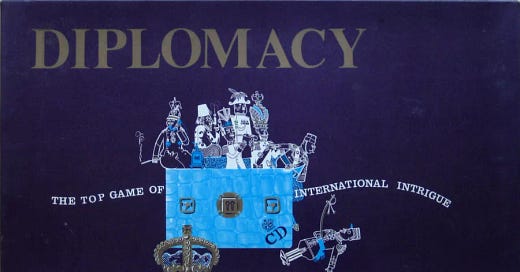“Crab Mentality” is the idea that if I can’t get out of the bucket, then by god nobody will get out of this bucket. Humans aren’t the only species that cooperates (“said the ant,”) but we do pretty well. As psychologist Michael Tomasello puts it — “It is inconceivable that you would ever see two chimpanzees carrying a log together.” But humans can cooperate, team up and climb out of that bucket.
If we want to.
We can get everyone (or most) out of the bucket. We don’t have to all sit at the bottom, sad. We can all be free. It’s “Win-win” in business or a “non-zero-sum game” in math and physics. But — of course — most games have winners and losers, and divide the players between them.1
Somebody stays in the bucket.
Allan B. Calhamer’s Diplomacy has seven great European powers trying to divide up that pie. There might be one winner, or an alliance of winners; but there are going to be losers. What made Diplomacy different isn’t what came in the box; but what was missing.
No Dice. No Cards. No Spinners.
No Luck.
In Diplomacy, combat is simple. Every turn each piece can move but you need more firepower to conquer a place. The reward? More pieces.
This makes reasonable game, but Diplomacy included …. diplomacy. Should England ally with France? Italy? Russia? No power could stand against the other six, but how do you divide things? Eventually, after a few turns, some powers will be doing well and others …. not so well. In an alliance, the mediocre powers cast a wary glance at their stronger brethren, as their enemy whispers “after I am gone, you are next.” The knives — already sharpened — slowly turn.
Diplomacy was supposedly played by the Kennedy family2, and while that may not be true, it was popular enough to warrant the publication of “The Gamer’s Guide to Diplomacy,” At the time I picked it off a store shelf, I wondered why an obscure seven player game that could take all day deserved a sixty-four page book on strategy. On reading it I discovered that Diplomacy was one of the first modern board games played by physical mail, with ‘zines galore. Much as in chess, openings were studied and given names, endgame techniques were discussed. Flipping through that guide, a world opened up.
Given the difficulty of getting seven players (and time constraints for negotiation) for many Diplomacy shines brightest when played by (e)mail, often with secret negotiations as well as “Press,” public decrees. Even if you don’t play the game much, watching a game can be fascinating.
Diplomacy also attracted researchers in Artificial Intelligence. Chess has been called “the Drosophilia of pyschology,”3 because of Chess’s appearance in many foundational studies. Diplomacy may be psychology’s newest guinea pig, because — as an asymmetric game of incomplete information and negotiation — Diplomacy is much better model for day-to-day human interactions.
AI quickly moved from playing No press diplomacy4 to using a simplified (computer) negotiation before eventually playing well (against human experts) using plain English.
Interestingly, the AI did quite well being totally honest5.
Whether honesty is actually the best policy remains hotly debated (in Diplomacy and in life); Diplomacy still draws a small but highly dedicated following, as it heads towards the 70th anniversary of initial publication. While I personally feel that there are games that capture uncertain negotiation in a much shorter time frame, I cannot deny that Diplomacy belongs in the Most Influential Games of the 20th Century.
Actually, I can. But I’d be lying.
Cooperative games still have winners and losers, but everyone gets to share the win or loss.
Maybe, maybe not. Reddit has a good answer.
There are also less biased sources.
Sometimes called “Gunboat Diplomacy,” where the negotiation phase is skipped and the game is played simply by moving pieces.
Although the humans were unaware which player — if any — was a bot, they may have still projected some deception on it. And the bot had other advantages, like being able to carry on six conversations simultaneously and offering strong moves to allies.




